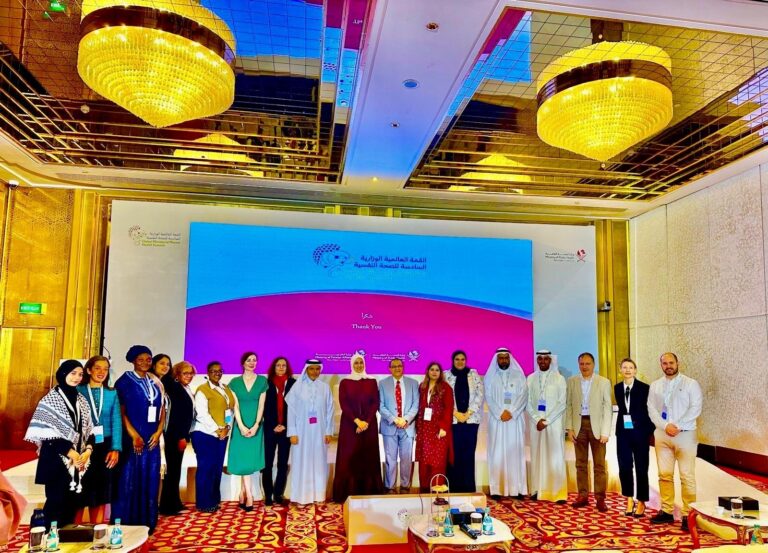Young Voices, Real Change: Outcomes from the Child and Youth Workshop
By Aviwe Funani, Senior Policy Officer, United for the Global Mental Health

Child and Youth Workshop Organisers, speakers and Her Excellency Sheikha Dr. Hessa bint Hamad Al Thani and Sheikh Dr. Mohammed Al-Thani from the Qatar Ministry of Health
Three out of four mental health conditions begin before age 25, and one in seven young people worldwide lives with a mental health condition. Yet services remain scarce: in low-income countries, there is only one mental health outpatient facility for every one million people. Despite this need, governments spend less than one percent of health budgets on mental health, and young people benefit the least. The 2024 WHO Mental Health Atlas calls for stronger cross-sector collaboration to meet the mental health needs of children and youth.
Over the past two days, the Global Ministerial Mental Health Summit has championed this call under the theme Transforming Mental Health through Investment, Innovation and Digital Solutions. The summit urged governments and partners to invest in mental health, adopt innovative community approaches and use digital tools to expand access to care. These priorities reflect what young people have long been demanding and the steps they are already taking to meet their own mental health needs.
To promote the transferal of innovation into policy, the Child and Youth Workshop, co-hosted by UNICEF, WHO, the Qatar Ministry of Public Health, and United for Global Mental Health, brought together government leaders, civil society organisations (CSOs), youth and people with lived experience.
The workshop featured Dr Elizabeth Allieu from Sierra Leone’s Psychiatric Teaching Hospital, Being initiative Advisor Manasi Gupta from HuesofMind, and Tami Benton, President of Adolescent Psychiatry at the Children’s Hospital of Philadelphia. The group selected systems and sustainable financing together with workforce and participation.
- That combination is grounded in reality: even with funding and policies, nothing moves without people. By investing in a competent, resilient, and supported workforce, social workers, teachers, paraprofessionals, and health workers, we build nurturing environments for young people in health, education systems and beyond, and we give systems life.
- By embedding youth and caregiver participation into these systems, we build trust, accountability, and services that people actually use. This choice reflects a very pragmatic truth: it’s not just about money or policy — it’s about the people who make change real.
Her Excellency Sheikha Dr. Hessa bint Hamad Al Thani and Sheikh Dr. Mohammed Al-Thani from the Qatar Ministry of Health prioritised the workshop and also participated in the discussion sharing expertise from experiences in Qatar. The representation of youth and people with lived experience at this High-Level Meeting sent a strong message of solidarity and commitment towards intergenerational learning, community informed innovations and the importance of policy in making mental health care more accessible for children and youth.
Working together, we can build a future where every young person has the mental health support they deserve.
“Training adolescents and young people as peer educators to deliver evidence-based mental health prevention and promotion is important. This is demonstrated in increased relatability, reduced stigma scalable support.” – Manasi Gupta, Founder HuesoftheMind and Being Advisor